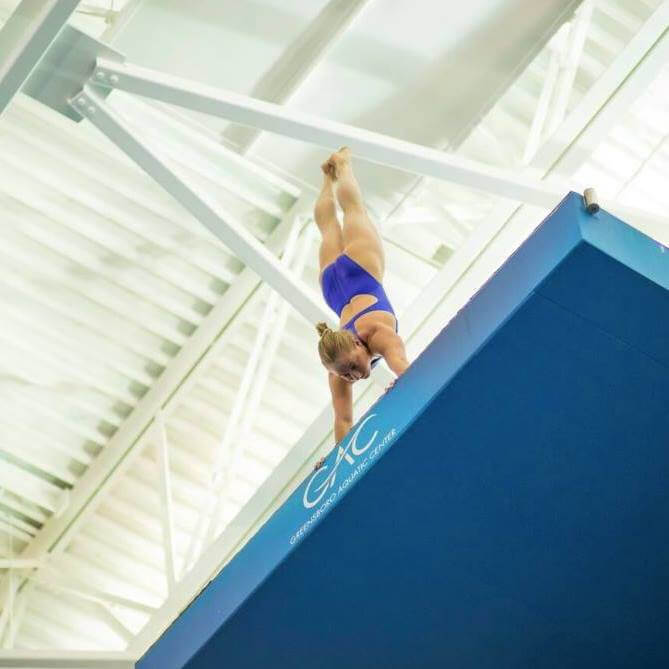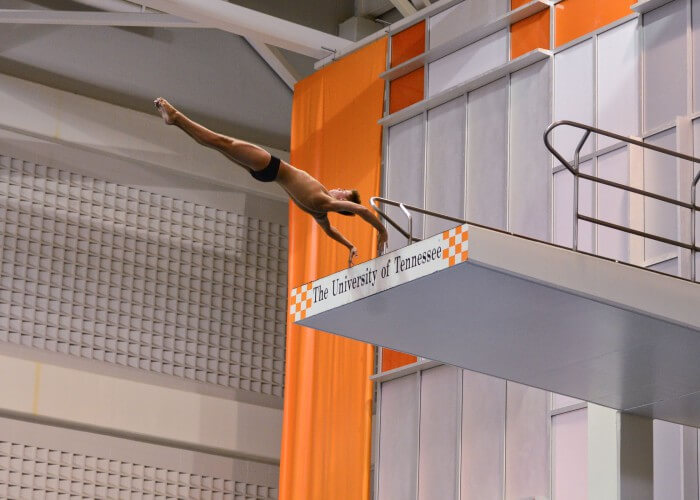Priming the Mind for Success

By Danielle Repper, Swimming World College Intern
Frequently, we athletes tend to make things more difficult than need be. I for one was certainly guilty on multiple occasions.
My coach always told me, “Just decide. You have to make a choice.” There are only two options, how hard can that be? I can, or I can’t. It’s as simple as that. Many wise men have proclaimed, “He who says he can, and he who says he can’t are both usually right.” Just decide.
Fear of Failure
Why does there seem to be an obstacle in the way? Why do we often have trivial excuses to avoid making this choice? The answer is we are too preoccupied with the idea of failure.
“Since diving has such a strong mental aspect in addition to it’s physical demands, it is crucial to keep a positive attitude so you don’t get stuck thinking about all the possible things that could go wrong,”Annika Lenz, a junior on the UCLA dive team stated. “Diving is a mentally exhaustive sport, so having a negative attitude can physically impair your ability to dive.”
Never be afraid to fail. As athletes, setbacks are inevitable. However, what you choose to do with those setbacks, separates the champions of mind from the uninspired. Those athletes who choose to learn from their shortcomings, or do everything in their ability to recover, are the ones who achieve greatness. Those athletes who push themselves when odds appear against them, eventually come out on top.
In your career as a diver, there will be time when you will face your greatest fear or challenge, whether it’s a new dive, a dive you have had a traumatic experience with, or the pressure of a competition. These fears contain the ability to blind you from realizing you’re thoroughly capable of trying that dive, or competing to the best of your ability. Fear of failure is an athlete’s kryptonite. There is no single answer. You have to find out what works best for you. Whichever you choose, changing your mindset always comes first.
When you’re stuck, start over. Clear your mind of all past obstacles and start from scratch. Set goals for yourself.
Head coach of the UCLA diving team, Tom Stebbins, shared his philosophy.
“I have always believed (and found) that you have to define your larger, long-term goals first. That will dictate your smaller, daily goals. Along the way you have to be able to evaluate whether your smaller/daily goals are moving you to the greater end result. If not, adjustments in training or goal setting may have to be made.”
It’s crucial to open your mind. It’s nearly impossible to learn when you instantly shut your mind down to new things out of frustration. Learn from criticism; do not let it defeat you. Realize your coach is not your enemy. Of course there will be times you will hear critique you don’t want to hear, and often times it may feel like no matter what you do, your work is never good enough. Do not give up. Be patient.
“Desire is a critical component to success and really the engine to the car, so to speak,” Stebbins said. “Athletes have to ‘want’ to move their needles. Coaches may or may not have an influence over that. I have found that we (as coaches), think we have more control over that than we actually do. The individual athlete largely dictates the speed at which their transformation happens.”
Peace of Mind in Chaos
It isn’t easy being a collegiate student-athlete. You have an immense amount of items on your plate. I’ve always liked to think of life as a college athlete as organized chaos. Constantly running between class and practice, scavenging for food any chance you get, catching sleep when possible, and waking up to the same rigorous schedule the next day. It is feasible with the correct mindset.
“I’m sore;” “I’m tired all the time;” “I don’t understand this;” and “I have to do this again tomorrow.” Not one of these phrases constitutes a positive mindset.
Rather, what should have been said was, “You know, I’m sore, but that means I’m building muscle and getting stronger.”
“I’m tired, but that’s because I’m working hard and soon it will pay off.”
“Hey coach, I’m having trouble understanding this technique, can you please help me?”
“I can’t wait to see what I’ll accomplish in practice tomorrow.”
This is the mindset of an athlete eager to fulfill their potential. Collegiate athletes are pushed harder than ever before. The competition is greater, and the obstacles are more challenging, therefore the work ethic must be unprecedented. It is possible. Each athlete is fully capable of achieving greatness if they commit their mind to doing so first.
At the end of each day, remember why you are where you are. You are here because you love what you do and are incredibly talented. You have worked exceedingly hard and have made many sacrifices to get to where you are right now. Enjoy and appreciate this adventure and live in the moment. Motivate your mind, and your body will follow.





Mowgli